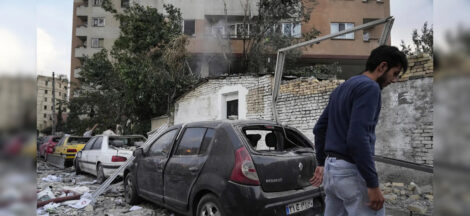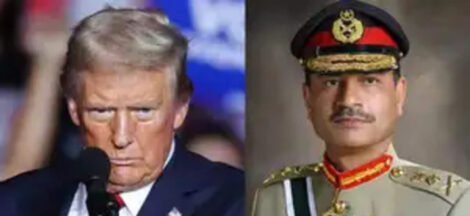By Dr. Gyan Pathak
Number of voices being made by several people in the helm of affairs simultaneously are creating Babel, a confusing noise, especially in respect of Pakistan. While Multi-party Joint Parliamentary delegations currently visiting various countries are at pain while explaining India’s position using a language of “exposing” Pakistan and defending “our right of self-defense”, BJP leaders at home, including Prime Minister of India Narendra Modi, are speaking the language of “aggression”. The Babel has already influenced opinions against India which is reflected in part in the “disappointment” faced by Indian multi-party parliamentary delegation in Colombia, which should serve as a wake-up call to BJP leaders.
While Congress MP Shashi Tharoor, who is one of the leaders of seven multi-party delegations, expressing his disappointment on May 29 in Colombia, over Colombia’s condolences for the people who lost their lives in Pakistan in India’s attack launched on May 7 against terror infrastructures, here at home Prime Minister Narendra Modi was heard using aggressive language in a public rally in West Bengal, “Pakistan should understand that we have entered your house and killed you three times.” His language even turned threatening, “From this land of Bengal, I, on behalf of 140 crore Indians, declare that Operation Sindoor is not over yet.”
If Colombia was confused over who is victim – India or Pakistan – it was not entirely their own fault. Indian leaders have contributed a lot by speaking in different languages – some are trying to convince the world that we are victim of Pakistan sponsored terrorism and their military misadventure, while others trying to convince the world, as PM Narendra Modi is trying by saying, “India has told the world that if there is a terrorist attack on India, the enemy will have to pay a heavy price. … We destroyed cross-border terror infrastructure, which Pakistan had never thought of. We have hit Pakistan thrice inside their home.”
One can just compare the language used by PM Narendra Modi, and the multi-party parliamentary delegation leader Shashi Tharoor in Colombia, not only to understand the difference, but also to know what risks India is running in using varied languages which are generating different kinds of opinions among the nations of the world. And every opinion counts, since there could come a time when we need votes and support from other nations especially with respect to terrorism and Pakistan.
Shashi Tharoor, while expressing his disappointment, said there can be no equivalence between those who attack and those who defend, adding that India was only exercising its right of self-defence by launching Operation Sindoor against Pakistan. In home turf, PM Modi said in public rally in West Bengal that Operation Sindoor was far from over.
Both the statements of the PM Narendra Modi and Shashi Tharoor are bound to give distinct understandings to the world what is happening between India and Pakistan. To drive home his point that India was the victim of terror and was not aggressor but only using its right to self-defence, Shashi Tharoor showed the picture of Pakistani Army officials attending the funerals of terrorists after India’s strike on their terror bases and said that if there is any misunderstanding, the delegation was there to clear that.
Tharoor said while addressing media in Bagota, “We were a little disappointed in the reaction of the Colombian government, which apparently expressed heartfelt condolences on the loss of lives in Pakistan after the Indian strikes, rather than sympathizing with the victims of terrorism. We will say to our friends in Colombia there can be no equivalence between those who dispatch terrorists and those who resist them. There can be no equivalence between those who attack and those who defend.”
One can understand the level of difficulty, Tharoor was undergoing in convincing Colombia while trying to expose Pakistan and their misdeeds. “We have very concrete proof,” Tharoor said of Pakistan’s involvement in the Pahalgam terror attack, adding, “In fact when this terrorist attack occurred, it was immediately claimed by an organization called the Resistance Front, which is a unit of the Lashkar-e-Taiba based in Muridke, Pakistan.”
Tharoor meticulously framed his statement and said, “India suffered a grievous terrorist attack on the 22nd of April … When this happened, of course, the world rose up to condemn the terrorist attack, but that was as far as it went. There was no action taken, not even by the country where these people had emerged from, Pakistan. Nobody was arrested, and there was no attempt at any prosecution. India decided that this kind of outrage could not go unpunished. On May 7, India chose to strike against known terror bases and launch pads.”
Numerous hints are there in this statement about the challenges that India is facing in respect of gaining support, both active and passive, from other countries, though Tharoor has highlighted Pakistan’s role in providing terrorists with sanctuary and support, saying “There (in Pakistan) was a well-publicised funeral of one of the terrorists on the sanction list. That funeral was attended by uniformed senior military and police personnel from Pakistan. That is the extent of complicity that we are seeing between the terrorists who perpetrate crimes of this nature and those who finance, guide, train, arm, and equip them and do provide them safe haven to continue their training and their other awful deeds.”
Tharoor also said, “… out concern is not with the rights of the Pakistani people to pursue development. Of course, they may do so, including with partnership with China. Our quarrel is only with the perpetration of terror against us.” This statement also contains many other hints about differences in voices of leaders in the entire Indian strategy in respect to Pakistan. India needs to streamline the various voices and strategy.
If PM Narendra Modi and BJP leaders go on using the language of aggression and always threatening Pakistan, then the world may begin to consider Pakistan as victim, as Colombia has manifested, while the real victims of Pakistan sponsored terrorism are Indians. Those in the helm of affairs, must mind their language, or else many countries may start supporting Pakistan. “Disappointment” in Colombia should be eye opener, not only in regard to pitfalls of using undiplomatic language, but also of simultaneously speaking different languages. (IPA Service)


